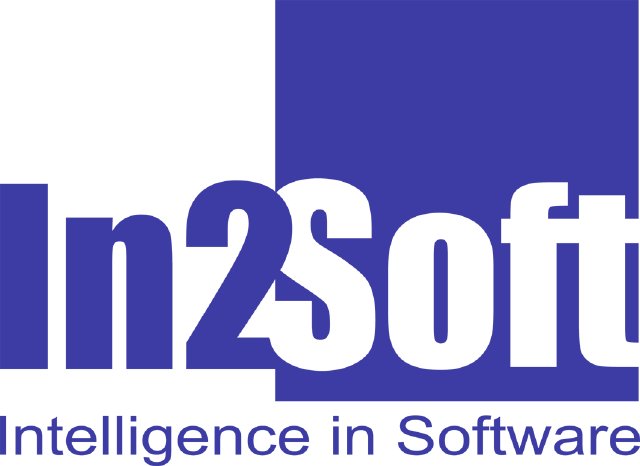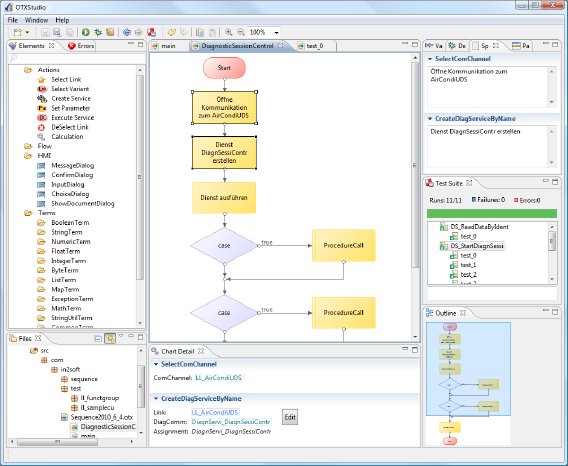At the beginning of this year, In2Soft held DiagnosticTechDays all over Germany. Our diagnostic experts travelled to nearby customer sites to provide all visitors with the latest information on developments, trends and possible solutions. Participants learned about the Euro 5/6 emission standards and the WWH (World-Wide-Harmonization). They also received detailed information on the latest trends in vehicle diagnostics as well as the future prospects of ODX, OTX and MVCI standards.
The OTXStudio
The OTXStudio is an authoring system for specifying and implementing OTX-formatted (test) sequences. In this way, the standard-compliant sequences of development, production and customer services within diagnostic process chains can be exchanged, re-used and extended.
The In2Soft authoring system in particular stands out with a short response time to user input and quick access to large volumes of data during OTX sequence creation by converting ODX files into the binary format developed by In2Soft. For working with the redesigned GUI - the highlight of the new OTX studio version - no programming knowledge is required.
New Formatter
The Formatter generates a PDF report directly from the ODX database. Single layers or complete projects are formatted according to the selected tree structure level.
With the new Formatter version a PDF is generated in only a few seconds. When constantly using less than 256 MB of RAM, up to 200 pages will be returned in one second. Another special feature of the new version is that even extremely large volumes of ODX data can be processed and formatted. The Formatter will be available both as standard version of the VisualODX DatabaseDesigner and as OEM-specific version, customized for vehicle manufacturers and their suppliers. The release is planned for the 3rd quarter 2010.
ASAM MCD-3D Server
In2Soft sets new standards with the new D-Server version. Significant improvements have been made by focusing on the runtime format, memory usage and performance. With the specially designed binary runtime format, ODX data storage can be optimized to perform up to 20 times faster. Thus, data can be distributed much faster worldwide and required hard disk storage for workshop testers is significantly reduced. Required RAM at runtime is hardly larger than the compressed data volume on the hard disk, in the worst case. Due to the new binary data usage, the performance has been extensively improved with almost immediate data access.
D-PDU-API
With the latest implementation of the D-PDU-API standard, In2Soft offers a complete API (Application Programming Interface) which serves as an interface between the D-Server and the VCI (Vehicle Communications Interface). Special features of the implementation are high-performance Link-Queues, multi-link and multi–client capability, extensive logging and support of standard interfaces such as Peak, CANcardX/XL etc. Supported communication protocols and busses are UDS, KWP, DoIP, TP1.6, TP2.0, CAN, K-Line and Ethernet.
D-PDU-API Test-Suite
The Test-Suite facilitates rapid installation of D-PDU-API-capable VCIs provided by any manufacturer. In various operating modes compliance (with API), performance and protocol testing is performed. Required test cases are provided. In addition to these automated tests also manual tests can be run from the GUI such as setting a parameter, sending a request, setting periodical send/receive actions etc. The Test-Suite is best suited for VCI tenders, e.g. to determine and compare VCI parameters of different providers.
D-PDU-API Log-Analyzer
In2Soft offers a high-performance software tool for analyzing log files which are written in the D-PDU-API documentation. Finding errors has been essentially simplified by sorting the log files by Logical-Links and displaying these in the tree structure. The sent and received messages in a link can be analyzed according to the data stream, communication parameters or temporal behavior. Thereby, an arbitrary number of links can be easily viewed. For analyzing log files when using VCIs of other manufacturers, In2Soft provides the Sniffer which serves as a router between the D-Server and the D-PDU-API and converts the log information into the desired format.


